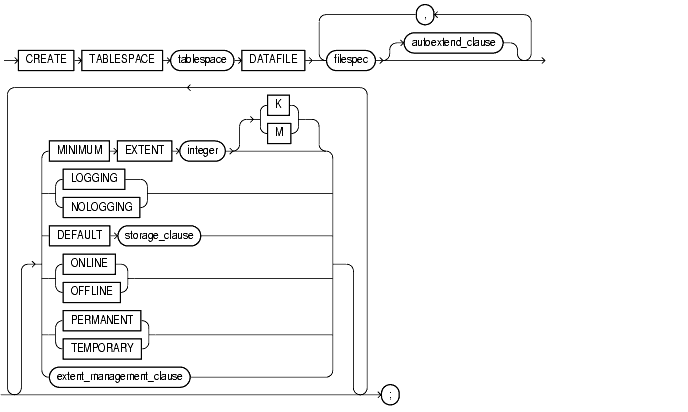Release 3 (8.1.7)
Part Number A85397-01
Library |
Product |
Contents |
Index |
| Oracle8i SQL Reference Release 3 (8.1.7) Part Number A85397-01 |
|
SQL Statements:
CREATE SYNONYM to DROP ROLLBACK SEGMENT, 4 of 31
Use the CREATE TABLESPACE statement to create a tablespace, which is an allocation of space in the database that can contain persistent schema objects.
When you create a tablespace, it is initially a read-write tablespace. You can subsequently use the ALTER TABLESPACE statement to take the tablespace offline or online, add datafiles to it, or make it a read-only tablespace.
You can also drop a tablespace from the database with the DROP TABLESPACE statement.
You can use the CREATE TEMPORARY TABLESPACE statement to create tablespaces that contain schema objects only for the duration of a session.
|
See Also:
|
You must have CREATE TABLESPACE system privilege. Also, the SYSTEM tablespace must contain at least two rollback segments including the SYSTEM rollback segment.
Before you can create a tablespace, you must create a database to contain it, and the database must be open.



storage_clause: See storage_clause.

tablespace
Specify the name of the tablespace to be created.
DATAFILE filespec
Specify the datafile or files to make up the tablespace.
autoextend_clause
Use the autoextend_clause to enable or disable the automatic extension of the datafile.
MINIMUM EXTENT integer
Specify the minimum size of an extent in the tablespace. This clause lets you control free space fragmentation in the tablespace by ensuring that every used or free extent size in a tablespace is at least as large as, and is a multiple of, integer.
|
See Also: Oracle8i Concepts for more information about using |
LOGGING | NOLOGGING
Specify the default logging attributes of all tables, indexes, and partitions within the tablespace. LOGGING is the default.
The tablespace-level logging attribute can be overridden by logging specifications at the table, index, and partition levels.
Only the following operations support the NOLOGGING mode:
INSERT (serial or parallel), Direct Loader (SQL*Loader)
CREATE TABLE ... AS SELECT, CREATE INDEX, ALTER INDEX ... REBUILD, ALTER INDEX ... REBUILD PARTITION, ALTER INDEX ... SPLIT PARTITION, ALTER TABLE ... SPLIT PARTITION, and ALTER TABLE ... MOVE PARTITION
In NOLOGGING mode, data is modified with minimal logging (to mark new extents INVALID and to record dictionary changes). When applied during media recovery, the extent invalidation records mark a range of blocks as logically corrupt, because the redo data is not logged. Therefore, if you cannot afford to lose the object, you should take a backup after the NOLOGGING operation.
DEFAULT storage_clause
Specify the default storage parameters for all objects created in the tablespace. For a dictionary-managed temporary tablespace, Oracle considers only the NEXT parameter of the storage_clause.
ONLINE | OFFLINE
PERMANENT | TEMPORARY
extent_management_clause
The extent_management_clause lets you specify how the extents of the tablespace will be managed.
|
|
Specify |
|
|
|
Specify
|
|
|
|
If you do not specify either
Restriction: If you specify |
|
|
||
DEFAULT Storage Example
This statement creates a tablespace named tabspace_2 with one datafile:
CREATE TABLESPACE tabspace_2 DATAFILE 'diska:tabspace_file2.dat' SIZE 20M DEFAULT STORAGE (INITIAL 10K NEXT 50K MINEXTENTS 1 MAXEXTENTS 999) ONLINE;
AUTOEXTEND Example
This statement creates a tablespace named tabspace_3 with one datafile. When more space is required, 50 kilobyte extents will be added up to a maximum size of 10 megabytes:
CREATE TABLESPACE tabspace_5 DATAFILE 'diskb:tabspace_file3.dat' SIZE 500K REUSE AUTOEXTEND ON NEXT 500K MAXSIZE 10M;
MINIMUM EXTENT Example
This statement creates tablespace tabspace_5 with one datafile and allocates every extent as a multiple of 64K:
CREATE TABLESPACE tabspace_3 DATAFILE 'tabspace_file5.dbf' SIZE 2M MINIMUM EXTENT 64K DEFAULT STORAGE (INITIAL 128K NEXT 128K) LOGGING;
In the following statement, we assume that the database block size is 2K.
CREATE TABLESPACE tbs_1 DATAFILE 'file_1.f' SIZE 10M EXTENT MANAGEMENT LOCAL UNIFORM SIZE 128K;
This statement creates a locally managed tablespace in which every extent is 128K and each bit in the bit map describes 64 blocks.
|
|
 Copyright © 1996-2000, Oracle Corporation. All Rights Reserved. |
|